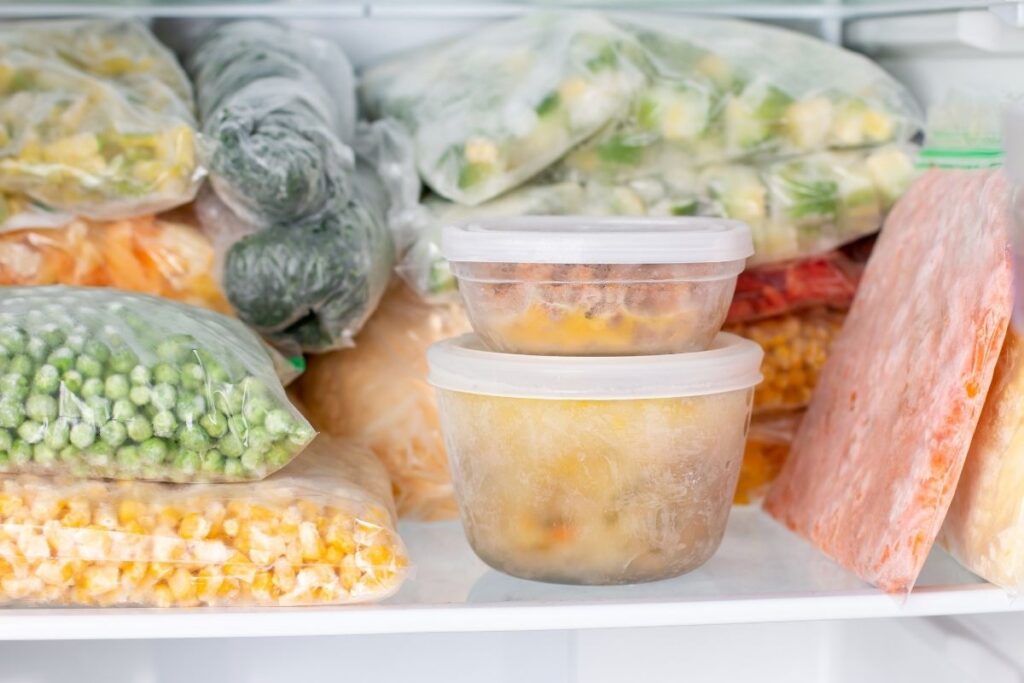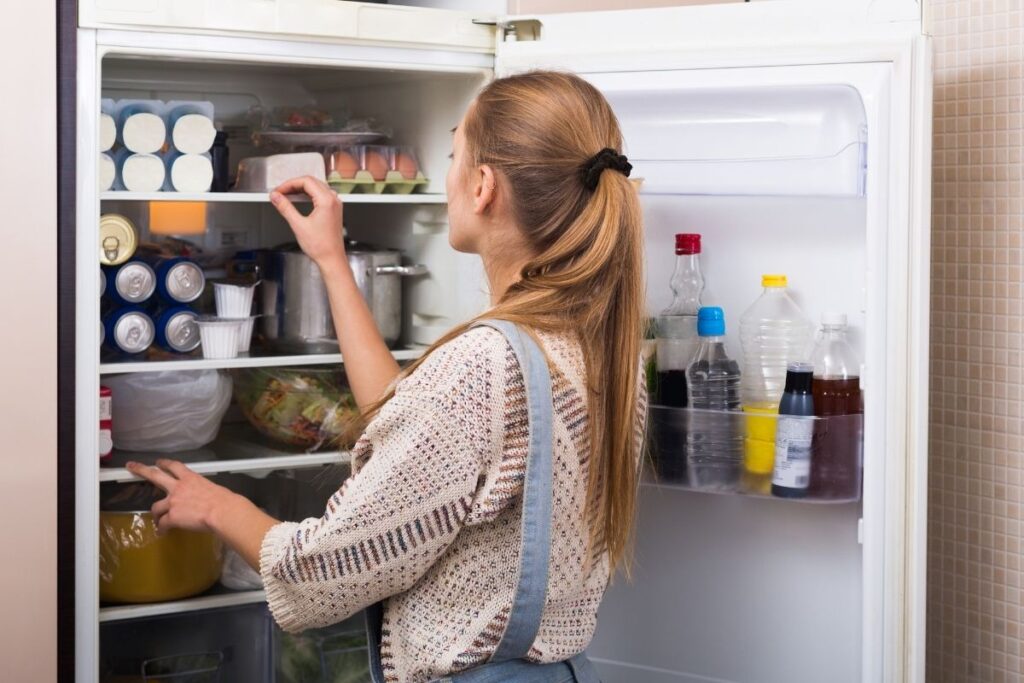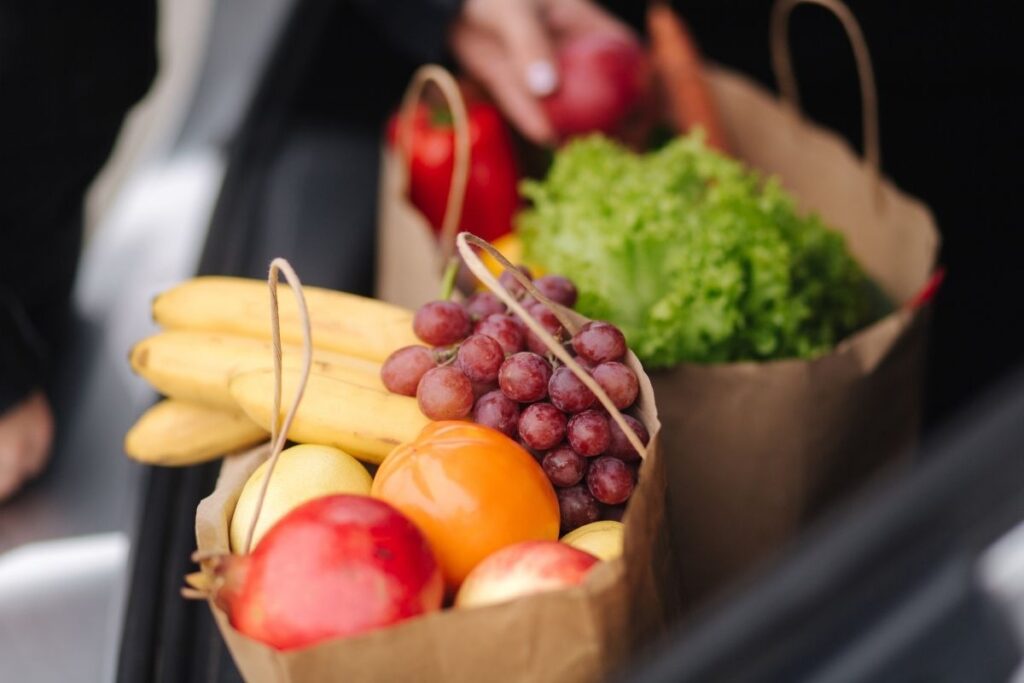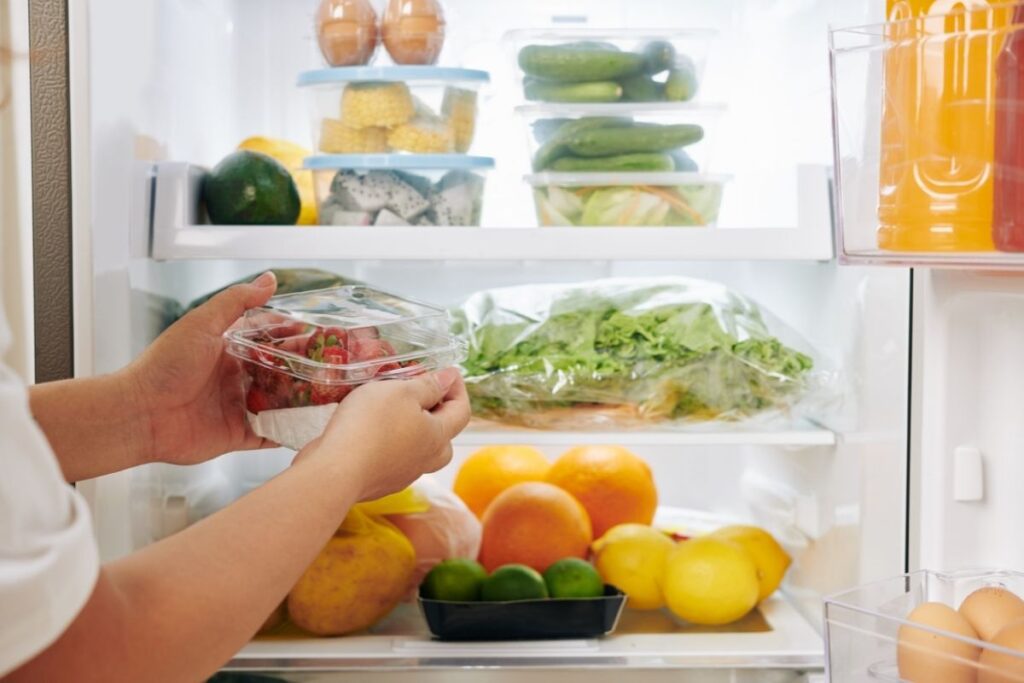Inside: Tired of wasting money on food that doesn’t get eaten? Read on for tips on how to reduce food waste and stop over-buying on groceries.
A guest post by Cora Gold
We typically have the best intentions when setting out to the grocery store. Many of us fill our carts with healthy foods and lots of fresh ingredients with the purpose of cooking and meal prepping for the week.
But what often happens is that we throw a lot of our groceries away, requiring us to repurchase food items and spend more than we need to.
According to the U.S. Department of Agriculture (USDA), food waste accounts for 30-40% of the food supply in the United States. There are a lot of components that may factor into this statistic, such as not having enough time or energy to cook as frequently as we’d like or simply buying more than we can eat before our food goes bad.
If you’re interested in how to reduce food waste and stop over-buying on groceries, read on for six tips to help.

6 Ways to Stop Overbuying on Groceries & Reduce Food Waste
Use these tips to reduce food waste in your home and to stop overbuying on groceries so you can save more money.
1. Break Up Shopping Into Several Trips
There’s no need to make a massive grocery trip all at once for a relatively small household. This rule is especially true for singles and couples.
When you consider what meals look like for you throughout the week, you probably cook a few times while also eating leftovers and ordering in or going out occasionally. If we’re honest with ourselves, between work and keeping up with other responsibilities that vie for our attention, it isn’t always practical to cook every day.
Rather than stockpile perishable foods that go bad quickly, plan to visit the grocery store more often. While that might now sound practical at first, think about how much time you typically spend at the store.
Rather than spending an hour or more one day a week, you can stop in for 15 or 20 minutes twice a week instead. You can even set a timer to stay focused and prevent you from going down unnecessary aisles.
With shorter lists, it is easier to get in and out of the store faster and also means you’re less likely to waste food.
Fruits and vegetables tend to go bad rather quickly. Try to purchase them close to when you will use them in order to reduce waste and prevent having to re-buy them.
Note: This tip wouldn’t apply to people who live far away from a grocery store. In that case, you would want to plan your meals accordingly and consolidate trips to save on time and gas. However, if you’re already driving right by a store on the way to and from work or dropping your kids off at school, it may help you waste less food.
If you find that shopping in-store is too distracting, you can opt for alternate methods like curbside pick-up or delivery.

2. Purchase Frozen Foods
Frozen foods are more of a lifesaver than you might realize, mainly when saving money and preventing food waste.
There seems to be a somewhat negative attitude toward purchasing frozen foods; however, the benefits outweigh the disadvantages. Frozen fruits and vegetables tend to be more nutrient-dense than fresh produce because they’re picked and packaged at the peak of ripeness.
Additionally, freezing meats and seafood makes them last much longer and helps preserve their nutritional value.
Buying seafood might seem impractical if you’re often too busy to cook, but it’s loaded with omega-3s and essential vitamins to help boost your immunity. Buying small amounts and freezing them until you’re ready is a great option.

3. Make a Grocery List
Do you have a specific recipe that you’d like to make for yourself or your family? Perhaps your kids have a few special requests for snacks and meals throughout the school week.
Make a list of the ingredients and requested food products before heading to the store. This tip might be obvious, but jotting down items you need will help you stay focused during your shopping trip.
Try to stick to a list as much as possible without adding additional items to your cart as you peruse the aisles. For example, are you all set with coffee and yogurt this week? Skip those sections and move on to the next thing. A list may actually encourage you only to shop down the most necessary aisles, as well.
If it’s too much of a hassle to remember to bring a pen to check items off, download a notepad app on your phone or sync your shopping list with your Amazon Echo or Google Nest.
Using an app makes it easy to update your grocery checklist as you think of items you need. Checking items off the list as you shop will help you to be more intentional and prevent you from forgetting anything important.

4. Check Your Inventory
After you’ve created your grocery list of the items you think you need, make sure to actually check your fridge, freezer, and pantry to make sure you don’t already have that item on hand.
You don’t want to spend money on items you don’t actually need or will use before they go bad so taking the few extra minutes to double-check will help prevent food waste and stop you from over-buying on groceries.
As you’re checking for what you have on hand, also make a mental note of what items are nearing their expiration. This can help you meal plan more efficiently so that you can make use of items instead of having to toss them because you forgot you even had them.
Paying close attention to what you have is a great way to simplify and save more money. Creating an inventory of the staple items in your pantry can help save you time and give you a more methodical way to check what you have on hand.

5. Buy What’s on Sale
More people are interested in saving money on groceries, especially since consumer goods reached 8.5% inflation as of March 2022. Without the certainty of when prices will drop, it’s essential to shop frugally.
Thankfully, grocery stores offer plenty of ways to save a few bucks. You can buy what you need and stick to your tight budget by signing up for rewards cards and loyalty programs and even using old-fashioned coupon clipping.
Shopping for sale items is a great way to prevent over-buying on groceries. Remember to compare prices at multiple stores and opt for store-brand items. Store brands are usually significantly cheaper than popular brands, and they often taste the same.
Always look at the price tag before putting items in your cart. You might think a pack of cookies or a fancier coffee brand won’t break the bank, but those additional dollars add up. Stop and think about whether that item is worth the price. If it takes more than a few seconds to decide, chances are you don’t really need it.
Make sure you’ll actually use them
Couponing and buying items on sale are great. But it only helps reduce food waste if you’re purchasing food you and your family will actually eat. Don’t buy things just because they are one sale.
It can be helpful to review the weekly sales flyer as you plan your meals for the week. Consider how long an item will keep, if you have the fridge or freezer space for it, and when you plan to eat it.
Those managers’ specials can be really tempting. But keep in mind those items are often close to their expiration date. Only buy them if you are sure you will eat them right away or have the freezer space for them.
The key is to be realistic with your purchases. Sale items aren’t a great deal if they end up in your garbage can.

6. Shop When You’re Full
Have you ever skipped lunch to get your grocery shopping done? A surefire way to over-buy at the grocery store is to shop when you’re hungry.
When you’re surrounded by food on an empty stomach, you may be more likely to satisfy your temporary cravings than purchase what you really need. This behavior could lead to unhealthy eating habits – processed foods, bakery goods, and other sweets – and spending more money on food than you originally planned.
Instead, eat a small meal or a filling snack before heading out the door. Perhaps a handful of mixed nuts, a fresh salad, or a sandwich will curb your appetite during your grocery trip.
You will be better prepared to resist impulse purchases and stop over-buying on groceries when your blood sugar is regulated and you can think clearly.
Bonus Tip: Start Composting
While composting won’t help you stop overbuying on groceries, it will help you to reduce food waste.
There are more options available than ever before to help make composting easier even for a newbie. Check out these helpful composting tips to get started.

Stop Over-Buying on Groceries by Shopping the Right Way
Grocery shopping the right way isn’t an exact science, and every person has to find a method that fits into their schedule and budget. However, if you’re looking to stop over-buying on groceries and reduce waste, these six steps are simple changes you can make to your routine.

Cora Gold is the Editor-in-Chief of Revivalist magazine. She loves writing about family and living life to the fullest. Follow Cora on Twitter, Facebook and Pinterest.
Check out this post for more ways to save money and waste less by repairing instead of replacing items in your home.
Sign up on the form below to get weekly decluttering tips and inspiration sent straight to your inbox. You’ll also get the free 5 Areas to Declutter in 10 Minutes Checklist to help you get started decluttering today.


Those tips will be very helpful for me as I definitely overbuy at the supermarket. I live alone, but do have a little dog, so I do waste food. I really can’t afford to do that as I am on a pension and it definitely doesn’t go far enough. Thank you so much for these tips, I will try to put them in action. 😊
I have a few grocery shopping tips to share. I shop at a store that offers individual coupon accounts. I have saved a couple hundred dollars per year that way. I also pay with a credit card that offers cash back and save another 2% that way. I do a major shop every two weeks and only pick up a few fresh items weekly. Most milk keeps for two weeks, bread can be frozen and thaws quickly, and I use mostly frozen veggies. I alternate fresh juices one week and canned the next. Frozen shrimp and scallops will thaw in about 10 minutes if you pour boiling water over them. I only cook meals for myself a few times a week. When I do cook, I try to implement “planned over” meals so I save on cooking fuel and time. I make larger quantities and freeze a few individual meals with the leftovers. I do keep a few frozen dinners and a pizza on hand but try to minimize using them. I found that shopping less frequently means fewer opportunities to impulse buy. Hope something I’ve mentioned helps someone save.
OMG Thank You!
Love this. I definitely do #1 tip. Do not use a grocery cart either. If I cannot carry it I don’t buy it.